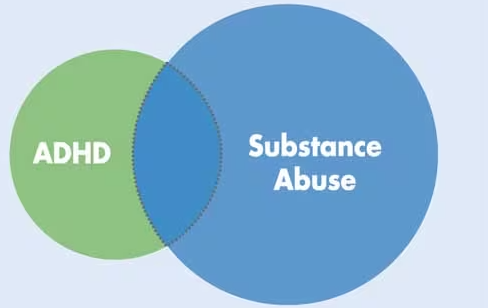Individuals with Attention Deficit Hyperactivity Disorder (ADHD) may face unique challenges in substance abuse recovery. ADHD is a neurodevelopmental disorder that can impact a person’s ability to focus, regulate impulses, and maintain attention. When combined with substance abuse, these challenges can become more complex. Here are some key considerations for individuals with ADHD in the context of substance abuse recovery:
- Increased Vulnerability to Substance Abuse:
- Research suggests that individuals with ADHD may be at a higher risk of developing substance use disorders compared to those without ADHD.
- Impulsivity and risk-taking behaviors associated with ADHD may contribute to experimentation with substances.
- Dual Diagnosis Treatment:
- It’s crucial to address both ADHD and substance use disorders concurrently. Integrated treatment that considers both conditions simultaneously is often more effective.
- Mental health professionals skilled in treating co-occurring disorders can provide comprehensive care.
- Medication Management:
- For individuals with ADHD, medication may be a part of their treatment plan. However, some medications can be misused or have interactions with substances of abuse.
- Close collaboration between mental health and addiction specialists is necessary to manage medications effectively.
- Behavioral Interventions:
- Behavioral therapy, such as Cognitive-Behavioral Therapy (CBT), can be beneficial for individuals with ADHD and substance use disorders.
- These interventions address impulsive behaviors, teach coping strategies, and help individuals develop healthier habits.
- Educational and Supportive Strategies:
- Psychoeducation is essential for individuals with ADHD and substance use disorders, helping them understand the interaction between these conditions.
- Support groups, both for ADHD and substance abuse, can provide a sense of community and understanding.
- Structure and Routine:
- Establishing a structured daily routine can be particularly helpful for individuals with ADHD. Predictable schedules and environments can assist in managing symptoms and preventing relapse.
- Mindfulness and Stress Management:
- Techniques such as mindfulness and stress management can be valuable for individuals with ADHD in recovery. Learning to manage stress can reduce the risk of turning to substances for relief.
- Family and Social Support:
- Involving family and friends in the recovery process can provide a strong support system. Educating loved ones about ADHD and substance abuse can foster understanding and empathy.
- Long-Term Monitoring and Aftercare:
- After completing initial treatment, ongoing monitoring and aftercare are crucial. Regular check-ins with mental health and addiction professionals can help prevent relapse.
It’s important to recognize that everyone’s journey is unique, and treatment approaches should be tailored to the individual’s specific needs and circumstances. Seeking professional help from healthcare providers experienced in both ADHD and substance abuse is crucial for effective and comprehensive care.








